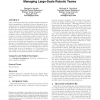Free Online Productivity Tools
i2Speak
i2Symbol
i2OCR
iTex2Img
iWeb2Print
iWeb2Shot
i2Type
iPdf2Split
iPdf2Merge
i2Bopomofo
i2Arabic
i2Style
i2Image
i2PDF
iLatex2Rtf
Sci2ools
149
click to vote
HRI
2009
ACM
2009
ACM
On using mixed-initiative control: a perspective for managing large-scale robotic teams
Prior work suggests that the potential benefits of mixed initiative management of multiple robots are mitigated by situational factors, including workload and operator expertise. In this paper, we present an experiment where allowing a supervisor and group of searchers to jointly decide the correct level of autonomy for a given situation (“mixed initiative”) results in better overall performance than giving an agent exclusive control over their level of autonomy (“adaptive autonomy”) or giving a supervisor exclusive control over the agent’s level of autonomy (“adjustable autonomy”), regardless of the supervisor’s expertise or workload. In light of prior work, we identify two elements of our experiment that appear to be requirements for effective mixed initiative control of large-scale robotic teams: (a) Agents must be capable of making progress toward a goal without having to wait for human input in most circumstances. (b) The operator control interface must help the...
| Added | 22 Jul 2010 |
| Updated | 22 Jul 2010 |
| Type | Conference |
| Year | 2009 |
| Where | HRI |
| Authors | Benjamin Hardin, Michael A. Goodrich |
Comments (0)

